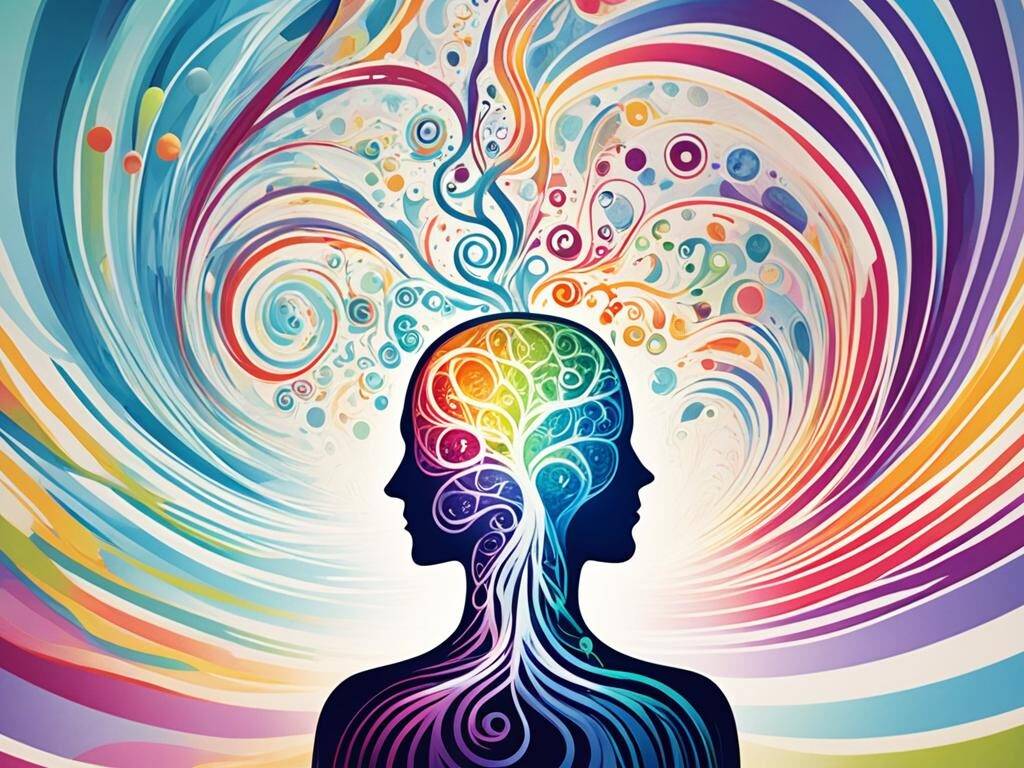Welcome to our comprehensive guide on the mind-body connection and its role in achieving holistic health. In today’s fast-paced world, it is essential to understand the profound impact our mental and emotional well-being has on our physical health. By embracing the mind-body connection, we can unlock the secrets to holistic wellness and cultivate a greater sense of balance and vitality in our lives.
At the heart of holistic health is the understanding that we are not separate entities, but rather interconnected beings, where our thoughts, emotions, and physical health are intricately intertwined. By nurturing this mind-body relationship, we can tap into the transformative power of holistic healing practices and unlock our inner potential for greater well-being.
In this article, we will dive deep into the world of holistic wellness and explore the concept of mind-body healing. From understanding the principles of holistic health to embracing a holistic mindset in our everyday lives, we will provide you with the tools and knowledge to embark on a journey of holistic living.
Key Takeaways:
- The mind-body connection is a fundamental aspect of holistic health.
- By nurturing the mind-body relationship, we can promote overall well-being.
- Holistic healing practices play a vital role in achieving mind-body harmony.
- Cultivating a holistic mindset supports holistic wellness in all areas of life.
- Integrating holistic practices into daily life can enhance holistic living.
Understanding Holistic Health
In the realm of health and wellness, the concept of holistic health is gaining significant recognition. This approach recognizes that true well-being encompasses the interconnectedness of the mind, body, and spirit. Integrative health practices and holistic healing techniques play a vital role in nurturing this harmonious balance.
Integrative health is a comprehensive and inclusive approach that combines conventional and alternative methods to address the whole person. It acknowledges the importance of treating not just the symptoms but also the underlying causes of illness.
In the pursuit of holistic health, numerous practices and therapies contribute to overall well-being, taking into account the unique needs and experiences of each individual. These holistic healing practices encompass physical, emotional, and spiritual aspects, creating a holistic approach to wellness.
Principles of Holistic Health
The principles of holistic health guide the practitioners and individuals on their holistic journey. These principles include:
- Whole-person perspective: Holistic health treats individuals as a whole, recognizing that each person is unique and interconnected on multiple levels.
- Prevention: Preventive measures play a crucial role in maintaining overall well-being and reducing the risk of illness and disease.
- Self-care: Empowering individuals to take responsibility for their health through self-care practices that promote balance and harmony.
- Mind-body-spirit connection: Considering the intricate relationship between the mind, body, and spirit to achieve optimal health and wellness.
- Respect for nature: Embracing natural approaches and therapies that work in harmony with the body’s innate healing abilities.
These principles form the foundation of holistic health, guiding individuals on their path to well-being.

“Holistic health is the state of complete physical, mental, and social well-being and not merely the absence of disease or infirmity.” – World Health Organization
Incorporating holistic healing practices into our lives empowers us to achieve balance and harmony in mind, body, and spirit. With a holistic approach, we have the opportunity to proactively care for our overall well-being and live a life of vitality and fulfillment.
The Mind-Body Medicine Approach
In the realm of holistic health, the mind-body connection takes center stage. Understanding this profound relationship is key to achieving overall well-being. Mind-body medicine embraces this connection and utilizes various therapies to promote holistic healing. By adopting a holistic lifestyle and mindset, individuals can cultivate optimal health and vitality.
The Power of Mind-Body Therapies
Mind-body therapies form the foundation of the holistic approach to health. These therapies recognize the intricate interplay between the mind and body and aim to restore balance and harmony. By addressing the root causes of imbalances, mind-body therapies offer a comprehensive healing approach. From reducing stress and promoting relaxation to enhancing self-awareness and fostering emotional well-being, these therapies empower individuals to take an active role in their own healing process.
Some popular mind-body therapies include:
- Meditation
- Yoga
- Acupuncture
- Tai Chi
- Massage Therapy
- Guided Imagery
- Energy Healing
Each of these therapies utilizes unique techniques to restore balance and promote holistic healing. Whether it’s the calming effects of meditation or the gentle movements of yoga, mind-body therapies offer a holistic approach to well-being.
Cultivating a Holistic Lifestyle
Embracing a holistic lifestyle is essential for integrating mind-body medicine into everyday life. This involves making conscious choices that support overall well-being and foster mind-body harmony. By prioritizing self-care, nourishing the body with whole foods, engaging in regular physical activity, and nurturing emotional health, individuals can create a foundation for holistic living.
“Adopting a holistic lifestyle means recognizing the interconnectedness of our physical, mental, and emotional well-being. It’s about taking care of ourselves in a way that honors the mind-body connection and supports balanced and sustainable health.”
Adopting a Holistic Mindset
In addition to embracing a holistic lifestyle, adopting a holistic mindset is equally important. This means viewing health and wellness through a holistic lens, understanding that optimal well-being extends beyond the absence of illness. A holistic mindset involves recognizing the impact of thoughts, emotions, and beliefs on overall health and actively participating in one’s own healing journey.
By cultivating self-awareness, practicing mindfulness, and promoting self-compassion, individuals can align their thoughts, emotions, and actions with holistic principles. This allows for a deeper connection with the mind, body, and spirit, promoting holistic wellness at every level.
The Mind-Body Medicine Approach in Action
Let’s take a closer look at an example to illustrate how mind-body medicine can be integrated into daily life:
| Mind-Body Therapy | Benefits |
|---|---|
| Meditation | Promotes relaxation, reduces stress, improves focus and mental clarity |
| Yoga | Increases flexibility and strength, reduces anxiety, improves posture and balance |
| Acupuncture | Relieves pain, improves energy flow, supports emotional well-being |
| Tai Chi | Enhances balance, reduces blood pressure, promotes mindfulness |
| Massage Therapy | Relieves muscle tension, reduces stress, improves circulation and lymphatic drainage |
| Guided Imagery | Enhances relaxation, reduces anxiety, supports emotional healing |
| Energy Healing | Restores energetic balance, promotes emotional well-being, supports overall healing |
These mind-body therapies can be seamlessly woven into daily life, offering a foundation for holistic wellness. By incorporating meditation, yoga, or acupuncture into a self-care routine, individuals can nurture their mind-body connection and experience the profound benefits of these therapeutic practices.
By embracing the mind-body medicine approach and integrating mind-body therapies into everyday life, individuals can embark on a holistic healing journey that promotes overall well-being. The power of the mind-body connection, combined with a holistic lifestyle and mindset, paves the way for optimal health and vitality.

Nurturing Mind-Body Harmony
Nurturing mind-body harmony is essential for achieving optimal well-being. When we prioritize whole-person health, which encompasses physical, mental, and emotional well-being, we create a solid foundation for a balanced and fulfilling life.
To achieve mind-body harmony, it is crucial to incorporate various holistic practices and make mindful lifestyle choices that promote overall wellness. By integrating different approaches and techniques, we can cultivate a harmonious relationship between our mind and body, allowing for greater balance and vitality.
The Importance of Whole-Person Health
Whole-person health refers to a holistic approach that considers every aspect of our well-being. It recognizes that our physical, mental, and emotional states are interconnected and influence one another. When any one of these aspects is neglected, it can lead to imbalances that impact our overall health and happiness.
By nurturing whole-person health, we give ourselves the opportunity to thrive in all areas of our lives. We enhance our physical vitality, sharpen our mental focus, and cultivate emotional resilience. Through this comprehensive approach, we can experience a greater sense of well-being and fulfillment in our daily lives.
Achieving Mind-Body Harmony
To achieve mind-body harmony, we can embrace a variety of holistic practices and lifestyle choices. These include:
- Meditation and mindfulness: Cultivating a regular meditation or mindfulness practice can help calm the mind, reduce stress, and enhance self-awareness.
- Exercise and movement: Engaging in physical activities that we enjoy, such as yoga, dance, or walking, not only benefits our physical health but also promotes mental and emotional well-being.
- Healthy nutrition: Nourishing our bodies with wholesome, nutrient-dense foods provides the fuel our minds and physical bodies need to function optimally.
- Stress management: Adopting stress-reduction techniques, such as deep breathing, journaling, or engaging in hobbies, can help us maintain a calm and balanced state of mind.
- Self-care: Making time for self-care activities, such as taking baths, practicing self-compassion, or engaging in creative pursuits, allows us to rejuvenate and nurture ourselves on a deeper level.
By incorporating these practices and choices into our daily lives, we can create a harmonious environment where both our mind and body thrive.
Mind-Body Harmony in Action: An Example
“Mind-body harmony is not about perfection but rather finding balance. For me, practicing yoga and mindfulness meditation have been transformative. They have allowed me to connect with my body, quiet my mind, and find inner peace. Through these practices, I’ve discovered a deeper sense of self-awareness and a greater appreciation for the interconnectedness of my physical, mental, and emotional well-being. They have become my foundation for living a holistic and fulfilling life.”
– Emma Thompson, Yoga and Mindfulness Practitioner

| Holistic Practices | Benefits |
|---|---|
| Meditation and mindfulness | – Calms the mind – Reduces stress – Enhances self-awareness |
| Exercise and movement | – Improves physical health – Boosts mood and energy – Increases mental clarity |
| Healthy nutrition | – Supports overall well-being – Enhances vitality – Nourishes the mind and body |
| Stress management | – Reduces anxiety and tension – Promotes emotional balance – Improves overall resilience |
| Self-care | – Increases self-love and self-compassion – Enhances emotional well-being – Allows for rejuvenation and relaxation |
The Power of the Mind-Body Connection
The mind-body connection is a powerful force that has a profound impact on our health and overall well-being. It is the intricate link between our thoughts, emotions, beliefs, and physical experiences. When our mind and body are in harmony, we are able to achieve holistic health, a state of complete well-being that encompasses not only our physical health, but also our mental and emotional well-being.
Our thoughts, emotions, and beliefs have a direct influence on our physical health. Positive thoughts and emotions can boost our immune system, reduce stress levels, and promote healing. On the other hand, negative thoughts and emotions can weaken our immune system, increase stress, and contribute to the development of various health conditions.
“The mind and body are not separate entities; they function together as an interconnected system.”
For example, stress and anxiety can manifest in physical symptoms such as headaches, digestive disorders, and muscle tension. Similarly, chronic pain can lead to feelings of frustration, anger, and depression. By understanding and harnessing the power of the mind-body connection, we can take control of our health and well-being.
One way to tap into the mind-body connection is through practices such as meditation, mindfulness, and visualization. These techniques help us to quiet the mind, reduce stress, and cultivate a sense of inner peace. By redirecting our thoughts and focusing on positive outcomes, we can positively influence our physical health.
The Mind-Body Connection in Action
Let’s take a closer look at how the mind-body connection works in various aspects of our lives:
- Physical Health: Research has shown that a positive mindset and optimistic outlook can boost our immune system, improve cardiovascular health, and enhance overall physical well-being.
- Emotional Health: Our emotions can have a profound impact on our physical health. Practices such as journaling, therapy, and relaxation techniques help us to process and release negative emotions, leading to improved emotional and physical well-being.
| Benefits of the Mind-Body Connection | Examples |
|---|---|
| Promotes relaxation and stress reduction | Meditation, deep breathing exercises |
| Enhances immune function | Positive affirmations, laughter therapy |
| Improves cardiovascular health | Yoga, tai chi |
| Alleviates chronic pain | Self-hypnosis, biofeedback |
By cultivating awareness and making conscious choices, we can harness the power of the mind-body connection to support our holistic health journey. When we acknowledge the profound influence our thoughts, emotions, and beliefs have on our physical well-being, we empower ourselves to take an active role in our own healing and well-being.

The Role of Mind-Body Wellness
Mind-body wellness is a fundamental aspect of holistic well-being. When our mind and body are in harmony, we can experience a greater sense of overall health and vitality. In this section, we will explore the role of mind-body wellness in promoting holistic well-being and the practices and techniques that can help foster a balanced mind-body connection.
At its core, mind-body wellness recognizes the interconnectedness of our mental and physical states. It acknowledges that our thoughts, emotions, and beliefs can profoundly influence our physical health and vice versa. By nurturing this mind-body connection, we can cultivate a state of holistic well-being that encompasses not only the absence of illness but also the presence of vitality, vitality, and inner peace.
There are various practices and techniques that contribute to mind-body wellness. Some examples include:
- Meditation: By quieting the mind and focusing on the present moment, meditation can help reduce stress, enhance self-awareness, and promote a sense of calm and clarity.
- Yoga: The practice of yoga combines movement, breath, and mindfulness to promote physical strength, flexibility, and inner peace. It can help release tension from the body and cultivate a sense of balance.
- Mindfulness: Being fully present and aware of our thoughts, feelings, and sensations in the present moment can help reduce stress, improve focus, and enhance overall well-being.
- Deep breathing: Taking slow, deep breaths can activate the body’s relaxation response, reducing stress and promoting a sense of calm.

These practices and techniques are just a few examples of the many ways in which we can nurture our mind-body wellness. By incorporating them into our daily lives, we can cultivate a deep sense of inner balance and well-being.
“The mind and body are not separate. What affects one, affects the other.”
| Mind-Body Wellness Benefits | Physical | Mental | Emotional |
|---|---|---|---|
| Reduced stress and anxiety | Improved immune function | Enhanced cognitive function | Increased self-awareness |
| Improved sleep quality | Increased energy levels | Reduced symptoms of depression | Greater emotional resilience |
| Enhanced physical performance | Pain management | Improved focus and concentration | Improved relationships |
As the table above demonstrates, mind-body wellness has a wide range of benefits that extend beyond physical health. By nurturing our mind-body connection, we can experience improvements in various aspects of our lives, including mental clarity, emotional well-being, and the ability to navigate life’s challenges with greater resilience.
In the next section, we will explore the importance of embracing a holistic healing approach and how it contributes to overall well-being.
Embracing a Holistic Healing Approach
Embracing a holistic healing approach involves recognizing the inseparable connection between the mind, body, and spirit. By understanding that these aspects of our being are intertwined, we can achieve true wellness and optimal health. In this section, we will explore the key principles of a holistic approach to health and discover the various holistic healing modalities available to support our well-being.
At the heart of the holistic healing approach is the belief that imbalances in one aspect of our being can affect the others. Rather than simply treating symptoms, a holistic approach strives to address the root causes of these imbalances. By identifying and addressing the underlying factors, we can achieve long-lasting healing and overall well-being.
The Principles of a Holistic Approach to Health
A holistic approach to health embraces several key principles that guide its practice. These principles include:
- Wholeness: Recognizing that we are multifaceted beings with interconnected physical, mental, emotional, and spiritual aspects.
- Individuality: Understanding that each person is unique, requiring personalized care and treatment.
- Prevention: Prioritizing proactive measures to maintain health and prevent imbalances before they occur.
- Balance: Striving to achieve equilibrium among all aspects of our being, fostering harmony and well-being.
Holistic Healing Modalities
Holistic healing encompasses a wide range of modalities that support the mind, body, and spirit in achieving balance and wellness. These modalities include:
- Mind-body practices such as yoga, meditation, and tai chi.
- Nutritional therapy, focusing on nourishing the body with whole, unprocessed foods.
- Herbal medicine, utilizing the healing properties of plants and botanicals.
- Energy healing modalities like Reiki and acupuncture.
- Bodywork therapies such as massage, chiropractic care, and reflexology.
These holistic healing modalities complement each other and work in harmony to address imbalances and promote overall well-being. By embracing a holistic approach to health, we open ourselves up to a multitude of healing possibilities that go beyond the traditional medical model.
The Power of a Holistic Healing Approach
“Holistic healing recognizes that we are more than just physical beings; we are complex and interconnected beings of body, mind, and spirit.” – Dr. Andrew Weil
A holistic healing approach holds great power in transforming our lives and promoting holistic well-being. By treating the whole person rather than just the symptoms, we tap into the body’s innate ability to heal itself. It allows us to address imbalances not only on a physical level but also on emotional, mental, and spiritual levels, leading to deeper and more meaningful healing.

In the next section, we will discuss how cultivating a strong mind-body relationship is crucial for holistic living. We will explore various practices and techniques that can enhance the mind-body connection and support overall well-being.
Cultivating the Mind-Body Relationship
Cultivating a strong mind-body relationship is essential for achieving holistic living. By nurturing this connection, we can unlock the transformative power within ourselves and experience a profound sense of well-being. In this section, we will explore various holistic practices that enhance the mind-body connection and support overall health and happiness.
Unlocking the Mind-Body Connection
The mind-body relationship is a fundamental aspect of our existence. It encompasses the intricate interplay between our thoughts, emotions, beliefs, and physical sensations. When we cultivate awareness and harness the power of this connection, we can influence our health, energy levels, and overall quality of life.
By embracing holistic practices such as meditation, yoga, and mindfulness, we can deepen our understanding of the mind-body relationship. These practices facilitate a state of presence and enable us to tap into the wisdom of our bodies, quiet the mind, and promote a sense of unity and balance.

Embracing Meditation for Mind-Body Harmony
Meditation is a powerful tool for cultivating the mind-body relationship and promoting holistic living. Through meditation, we can quiet the mind chatter, enhance self-awareness, and develop a deep sense of inner peace and clarity.
Regular meditation practice has been scientifically proven to reduce stress, improve emotional well-being, and boost overall health. By dedicating a few minutes each day to meditation, we create space for self-reflection, introspection, and rejuvenation.
Whether you choose to practice focused attention meditation, loving-kindness meditation, or mindfulness meditation, the benefits are vast. Meditation allows us to cultivate a sense of stillness, release tension from the body, and embrace the present moment with gratitude and acceptance.
Yoga: A Holistic Union of Mind and Body
Yoga is a holistic practice that unites the mind, body, and breath. Through a series of physical postures, breathwork, and meditation, yoga promotes mind-body harmony, flexibility, strength, and relaxation.
Practicing yoga not only increases physical vitality but also cultivates mental and emotional well-being. The intentional movements, deep breathing, and mindfulness foster a profound sense of connection within ourselves and the world around us.
By engaging in regular yoga practice, we honor our bodies, align our energy, and cultivate a deeper awareness of our physical and emotional states. Yoga invites us to embrace our authentic selves, let go of judgment, and find balance amidst the challenges of daily life.
Mind and body are like parallel universes. Anything that happens in the mental universe must leave tracks in the physical one.
– Deepak Chopra
Mindfulness: Embracing the Present Moment
Mindfulness is the art of being fully present in the current moment, without judgment or attachment. By incorporating mindfulness into our daily lives, we become more attuned to the mind-body connection and the subtleties of our experiences.
Through mindfulness, we develop a non-reactive awareness of our thoughts, emotions, and physical sensations. By observing these aspects without judgment, we can cultivate greater self-compassion, reduce stress, and enhance overall well-being.
Practicing mindfulness can be as simple as engaging in mindful eating, mindful walking, or mindful breathing. By bringing our attention to the present moment, we can fully experience the richness of life and cultivate a deep sense of gratitude and contentment.
The Power of Holistic Practices for Mind-Body Connection
By embracing holistic practices such as meditation, yoga, and mindfulness, we nurture and cultivate the mind-body relationship. These practices enhance our self-awareness, promote balance, and support our overall well-being. When we prioritize the mind-body connection, we unlock our innate potential for holistic living.
Remember, the mind and body are intimately connected, and our actions and choices can profoundly impact our well-being. Let us cherish and cultivate this remarkable relationship as we journey towards holistic living and flourishing health.
Integrating Holistic Practices Into Daily Life
Embracing a holistic lifestyle involves more than just occasional holistic practices; it requires integrating these practices into our daily routines. By incorporating holistic living into our everyday lives, we can maintain balance and experience the full benefits of a holistic lifestyle.
Here are some practical ways to integrate holistic practices into your daily life:
- Nourish Your Body: Opt for organic, whole foods and prioritize hydration. Include a variety of fruits, vegetables, whole grains, and lean proteins in your meals.
- Move Your Body: Engage in regular physical activity that you enjoy, whether it’s yoga, dancing, walking, or any other form of exercise. Find ways to incorporate movement into your daily routine.
- Prioritize Self-Care: Carve out time for self-care activities that nurture your mind, body, and spirit. This can include practices such as meditation, deep breathing exercises, or taking a relaxing bath.
- Practice Mindfulness: Cultivate present-moment awareness and bring mindfulness to your daily activities. Whether it’s eating, walking, or interacting with others, be fully present in each moment.
- Cultivate Healthy Relationships: Surround yourself with supportive and positive individuals who align with your holistic lifestyle values. Create meaningful connections and engage in open and honest communication.
- Connect with Nature: Spend time outdoors and immerse yourself in the natural world. Whether it’s a walk in the park, gardening, or simply sitting under a tree, connecting with nature can restore harmony and balance.
- Embrace Holistic Therapies: Explore different holistic therapies that resonate with you, such as acupuncture, massage, or energy healing. Incorporate these therapies into your wellness routine for enhanced well-being.
Remember, the key to integrating holistic practices into your daily life is consistency and intention. Embrace each day as an opportunity to align with your holistic lifestyle and nourish your mind, body, and spirit.
By adopting a holistic lifestyle and integrating holistic practices into your daily routine, you can experience the profound benefits of holistic living. It’s about embracing a mindful and conscious approach to your well-being that encompasses all aspects of your life.
The Benefits of a Holistic Lifestyle
Adopting a holistic lifestyle offers a multitude of benefits for your overall health and well-being:
- Promotes physical, mental, and emotional balance
- Enhances overall vitality and energy levels
- Supports the body’s natural healing processes
- Reduces stress and promotes relaxation
- Boosts immune function and strengthens resilience
- Improves mental clarity and cognitive function
- Enhances emotional well-being and happiness
- Fosters a deeper connection with oneself and others
Embracing a holistic lifestyle is a journey of self-discovery and self-care. It requires a commitment to prioritizing your well-being and making conscious choices that align with your holistic values. By integrating holistic practices into your daily life, you can experience the transformative power of holistic living.

Achieving Mind-Body Balance
In the pursuit of holistic living, achieving mind-body balance is paramount. The delicate interplay between the mind and body influences our overall well-being, making it essential to cultivate harmony between these aspects of ourselves. Striving for mind-body balance nurtures holistic health, allowing for a more fulfilling and vibrant life.
To help restore and maintain equilibrium, there are various practical strategies and techniques that one can incorporate into their daily routine. Some effective ways to achieve mind-body balance include:
- Physical Activity: Engage in regular physical exercise like yoga, tai chi, or walking to invigorate the body and calm the mind.
- Mindfulness Meditation: Practice mindfulness meditation to cultivate present moment awareness and reduce stress, promoting a sense of balance.
- Healthy Diet: Nourish the body with a wholesome, balanced diet that includes fresh fruits, vegetables, and whole grains for optimal physical and mental well-being.
- Stress Management: Incorporate stress management techniques such as deep breathing exercises, journaling, or engaging in hobbies to alleviate stress and maintain equilibrium.
- Quality Sleep: Prioritize quality sleep to allow the body and mind to rejuvenate and restore balance.
By integrating these practices into daily life, individuals can create a solid foundation for mind-body balance, empowering holistic living. Each person’s journey towards achieving this balance is unique, and it requires a commitment to self-care and self-awareness.
Remember, achieving mind-body balance is an ongoing process, requiring patience and self-kindness. Embracing a holistic approach to life helps harmonize the mind and body, cultivating a state of well-being that extends to all areas of one’s existence.
Benefits of Mind-Body Balance
When we attain mind-body balance, we unlock a multitude of benefits that enhance our overall holistic living. Some of the potential benefits include:
- Reduced Stress: Achieving balance helps reduce stress levels, promoting emotional resilience and mental well-being.
- Enhanced Physical Health: Mind-body balance supports optimal physical health by reducing the risk of chronic diseases and promoting vitality.
- Improved Mental Clarity: When the mind and body are in harmony, mental clarity and focus are enhanced, leading to improved cognitive function.
- Heightened Emotional Well-being: A balanced mind and body contribute to emotional stability and an increased sense of happiness and contentment.
- Increased Energy: Achieving balance revitalizes the body, leading to increased energy levels and overall vitality.
By striving for mind-body balance, individuals can unlock these profound benefits, paving the way for holistic well-being.
Maintaining Mind-Body Balance
The journey to mind-body balance is an ongoing process, and it requires consistent effort and self-care. Here are some additional tips for maintaining mind-body balance:
“Balance is not something you find, it’s something you create.” – Jana Kingsford
- Self-Awareness: Practice self-reflection and self-awareness to identify areas of imbalance and make necessary adjustments.
- Regular Check-Ins: Take time to assess your mind and body regularly, identifying any signs of imbalance before they escalate.
- Boundaries: Set clear boundaries to protect your well-being, ensuring a healthy balance between work, relationships, and personal time.
- Mindful Rest: Incorporate moments of mindful rest throughout the day to recharge and refocus.
- Supportive Community: Surround yourself with like-minded individuals who prioritize holistic living, providing encouragement and inspiration.
By implementing these strategies and remaining dedicated to self-care, individuals can maintain a state of mind-body balance that supports their overall well-being and holistic living.

| Benefits of Achieving Mind-Body Balance | Strategies for Maintaining Mind-Body Balance |
|---|---|
| Reduced stress levels | Practice self-awareness |
| Enhanced physical health | Regular check-ins |
| Improved mental clarity | Set clear boundaries |
| Heightened emotional well-being | Mindful rest |
| Increased energy levels | Build a supportive community |
The Holistic Approach to Healing
The holistic approach to healing focuses on treating the individual as a whole, taking into account the interconnectedness of the physical, mental, and emotional aspects of health. By addressing all dimensions of well-being, holistic healing practices aim to promote complete wellness and restore balance.
Embracing a holistic approach to health offers numerous benefits. It allows for a comprehensive understanding of the root causes of health imbalances, rather than solely focusing on symptom management. By treating the entire person, holistic healing techniques provide a more holistic and long-lasting solution, addressing the underlying issues contributing to ill health.
There are various popular holistic healing modalities that individuals can explore. These modalities focus on integrating different practices to restore equilibrium and promote overall well-being. Some common holistic healing approaches include:
- Acupuncture: A traditional Chinese medicine technique that involves the insertion of thin needles into specific points on the body to stimulate energy flow and restore balance.
- Herbal Medicine: The use of natural herbs and plants to address health concerns and support the body’s healing processes.
- Energy Healing: Modalities such as Reiki, where practitioners channel energy to remove energy blockages and promote physical and emotional healing.
- Massage Therapy: The manipulation of soft tissues in the body to improve circulation, reduce muscle tension, and promote relaxation.
By incorporating these holistic practices into their healing journey, individuals can benefit from a well-rounded approach that supports their overall well-being. Whether it’s addressing physical ailments, managing stress, or enhancing emotional well-being, a holistic approach to healing offers a holistic and comprehensive solution.
Remember, holistic healing is not a substitute for medical advice or treatment. It is essential to consult with qualified healthcare professionals before incorporating any new healing practices into your routine. However, when used alongside conventional medicine, holistic healing can be a valuable complement, supporting the body’s natural healing processes.
Embrace the power of the holistic approach to healing and unlock the potential for holistic well-being.

Benefits of a Holistic Approach to Healing
| Aspect | Benefits |
|---|---|
| Physical Health | – Addresses underlying causes of illness – Promotes natural healing processes – Supports the body’s immune system |
| Mental Health | – Reduces stress and anxiety – Enhances clarity and focus – Supports emotional well-being |
| Emotional Health | – Aids in the release of emotional traumas – Supports emotional resilience – Encourages introspection and self-awareness |
Unleashing the Power of Holistic Therapies
Holistic therapies have gained immense popularity due to their profound ability to support overall well-being. These therapies encompass a wide range of practices that address the mind, body, and spirit, offering a holistic approach to healing. By embracing holistic healing practices and incorporating mind-body therapies into our wellness routines, we can unlock the true power of these transformative modalities.
One of the most influential aspects of holistic therapies is their focus on treating the individual as a whole. Rather than solely addressing physical symptoms, these therapies recognize the interconnectedness of the mind, body, and spirit in promoting optimal health. By considering the person as a complete entity, holistic therapies offer a holistic approach that nurtures all aspects of well-being.
The Role of Holistic Therapies in Holistic Health
Holistic health involves achieving balance and harmony within oneself. It emphasizes the importance of taking a comprehensive view of health and well-being, recognizing that physical ailments often have underlying emotional or mental causes. Holistic therapies play an integral role in promoting holistic health by providing therapeutic techniques and practices that target the mind-body connection.
Mind-body therapies, in particular, form a key component of holistic healing practices. These therapies recognize the intricate relationship between the mind and body and aim to optimize this connection for healing and well-being. By guiding individuals to tap into their innate healing capabilities, mind-body therapies enable them to harness their own potential for holistic wellness.
“Holistic therapies recognize that true healing encompasses more than just the physical body. They encompass the mind, body, and spirit, promoting a balanced and harmonious state of well-being.”
Some common mind-body therapies include:
- Meditation: A practice that cultivates mindfulness and deep relaxation, promoting mental clarity and emotional well-being.
- Yoga: An ancient discipline that combines physical postures, breathing exercises, and meditation to promote physical strength and flexibility, mental focus, and emotional balance.
- Aromatherapy: The therapeutic use of essential oils to enhance mood, reduce stress, and promote relaxation.
These mind-body therapies have been shown to have a range of benefits, including stress reduction, improved sleep, enhanced immune function, and increased overall well-being. By integrating these practices into our lives, we can tap into the power of holistic healing and experience profound transformation.
Furthermore, holistic therapies offer a personalized approach to healing, recognizing that each individual is unique and requires tailored treatment. These therapies take into account not only the physical symptoms but also the emotional and mental state of each person, ensuring a comprehensive and individualized healing experience.

The image above represents the transformative nature of holistic healing practices. It highlights the connection between the mind, body, and spirit and illustrates the power of embracing holistic therapies for overall well-being.
The Benefits of Holistic Therapies
Holistic therapies offer a myriad of benefits that extend beyond physical healing. By harmonizing the mind, body, and spirit, these therapies promote holistic well-being on multiple levels.
“By integrating holistic therapies into our lives, we can experience profound healing and achieve a state of balanced well-being that encompasses the mind, body, and spirit.”
Some key benefits of holistic therapies include:
- Promoting relaxation and stress reduction
- Boosting immunity and overall physical health
- Enhancing mental clarity and focus
- Supporting emotional healing and well-being
- Fostering spiritual growth and self-awareness
By embracing holistic therapies and incorporating them into our daily lives, we can unleash the power of these transformative practices and experience a renewed sense of vitality and well-being.
Embracing a Holistic Mind-Body Lifestyle
Living a holistic lifestyle goes beyond incorporating holistic practices into specific areas of our lives. It involves adopting a holistic mindset and consciously making choices that promote overall well-being. By embracing a holistic mind-body lifestyle, we can achieve greater harmony, balance, and vitality in all aspects of our lives.
When we talk about a holistic lifestyle, we refer to a way of living that recognizes the interconnectedness of our physical, mental, emotional, and spiritual well-being. It emphasizes the importance of nurturing and caring for each of these aspects in a holistic manner, as they are all intertwined and impact one another.
By adopting a holistic mindset, we become more aware of the choices we make and their potential effects on our well-being. We understand that our lifestyle choices can either contribute to or detract from our holistic living journey.
Benefits of a Holistic Mindset
Developing a holistic mindset brings numerous benefits to our lives. Some of these benefits include:
- Enhanced self-awareness: A holistic mindset encourages us to explore our thoughts, feelings, and beliefs, fostering a deep sense of self-awareness. This self-awareness allows us to better understand our needs and make choices that align with our values and well-being.
- Greater balance and harmony: As we become more attuned to our mind and body, we can identify areas that are out of balance and take steps to restore harmony. This awareness helps us make conscious choices that support holistic well-being.
- Improved overall well-being: Adopting a holistic mindset leads to an overall improvement in our well-being. By prioritizing self-care, self-reflection, and mindful living, we can experience increased energy, reduced stress levels, better mental clarity, and enhanced emotional resilience.
- Strengthened mind-body connection: A holistic mindset deepens our connection with ourselves, allowing us to recognize the subtle signals and messages our bodies provide. This connection empowers us to take proactive measures to support our physical health and manage any discomfort or imbalances.
Making Choices for Holistic Living
Living a holistic mind-body lifestyle involves making conscientious choices in various areas of our lives. Here are some key aspects where we can incorporate holistic practices:
| Physical Well-being | Mental and Emotional Well-being | Social and Environmental Well-being |
|---|---|---|
| Regular exercise or movement that aligns with our body’s needs and preferences | Engaging in stress-management techniques such as meditation, mindfulness, and deep breathing | Fostering healthy relationships and connections with loved ones |
| Nourishing our bodies with whole foods and staying hydrated | Cultivating positive self-talk and practicing self-compassion | Contributing to a sustainable environment through eco-conscious choices |
| Getting enough restful sleep and prioritizing relaxation | Engaging in activities that promote mental stimulation and creativity | Participating in community initiatives or volunteering |
By consciously considering these aspects and integrating holistic practices into our daily routines, we create a life that supports our holistic well-being. The choices we make contribute to the overall balance, vitality, and fulfillment we experience on our holistic living journey.

By embracing a holistic mind-body lifestyle, we can cultivate a deep sense of well-being and live a more fulfilling and balanced life. The interconnectedness of our physical, mental, emotional, and spiritual aspects becomes a guiding principle in all that we do, allowing us to experience the transformative power of holistic living.
The Impact of the Mind-Body Connection on Well-being
The mind-body connection plays a vital role in our overall well-being. The intricate interplay between our thoughts, emotions, and physical health is a powerful force that influences every aspect of our lives. Understanding and harnessing this connection can lead to holistic wellness and a more fulfilling life.
When our minds and bodies are in sync, we experience a greater sense of balance, harmony, and vitality. Our thoughts and emotions can directly affect our physical health, shaping our experiences and influencing the choices we make. Conversely, the state of our physical well-being can impact our mental and emotional state.
By acknowledging the mind-body connection and nurturing it, we have the potential to enhance our well-being in numerous ways. Properly managing stress, cultivating positive thoughts, and engaging in practices that promote mind-body healing can all contribute to a healthier, more vibrant life.
Let’s explore the potential benefits of harnessing the mind-body connection in various areas of life:
1. Physical Health
Our thoughts and emotions can directly impact our physical health. When we experience stress, for example, our bodies respond by releasing stress hormones that can lead to various health issues. On the other hand, practicing relaxation techniques, such as meditation or deep breathing, can help reduce stress and promote overall physical well-being.
2. Emotional Well-being
Our emotions can significantly influence our mental health and overall emotional well-being. Negative emotions, such as anger, fear, or sadness, can create imbalances within our minds and bodies, affecting our ability to cope with daily challenges. Cultivating positive emotions, such as joy, gratitude, and love, can contribute to emotional resilience and a greater sense of well-being.
3. Mental Clarity and Focus
By nurturing the mind-body connection, we can enhance our mental clarity and focus. Practices like meditation and mindfulness can help calm the mind, reduce mental chatter, and improve concentration. This heightened state of awareness and focus enables us to navigate life’s challenges more effectively and make clearer decisions.
4. Relationships and Social Connections
The mind-body connection also influences our relationships and social connections. When we are at peace within ourselves and in tune with our emotions, we are better equipped to build meaningful connections with others. By fostering empathy, compassion, and open communication, we cultivate healthier relationships that contribute to our overall well-being.

| Benefits of the Mind-Body Connection |
|---|
| Enhanced physical health |
| Improved emotional well-being |
| Heightened mental clarity and focus |
| Strengthened relationships and social connections |
By nurturing the mind-body connection, we can experience the profound impact it has on our well-being. From improved physical health to enhanced emotional well-being and mental clarity, this connection offers a pathway to holistic wellness. Embracing practices that support the mind-body connection empowers us to live more harmonious, fulfilling lives.
Conclusion
In conclusion, the mind-body connection is a fundamental aspect of holistic health. It serves as a powerful force that influences our overall well-being. By nurturing a harmonious relationship between the mind and body, we can cultivate balance and achieve optimal health and wellness.
To fully embrace holistic living, it is essential to embrace holistic healing practices that support the mind-body connection. Techniques such as meditation, yoga, and mindfulness can help align our thoughts, emotions, and physical sensations, leading to increased self-awareness and overall well-being.
Furthermore, adopting a holistic mindset is key. By recognizing the interconnectedness of our physical, mental, and emotional selves, we can make conscious choices that prioritize our well-being. This may include maintaining a healthy diet, engaging in regular exercise, practicing self-care, and nurturing positive relationships.
Ultimately, the journey to holistic living involves an ongoing commitment to understanding and utilizing the mind-body relationship. By harnessing the power of this connection, we lay the foundation for a life of balance, vitality, and complete wellness.

